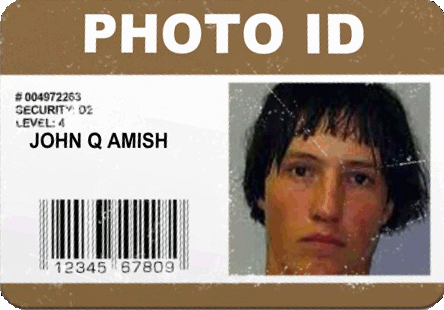
Catch-22 Amish Style
This hypothetical example describes a man raised in the Amish understanding of the Bible, but no longer living in their community. He chooses to live by what he has accepted as Biblical truth, but is not currently a member of any particular religious association, though he considers himself a Christian. His individual religious belief - not to have photos taken - is protected by the U.S. Constitution, and it is not unlike that of a significant centralized belief system. His situation involves applying for tokens to utilize Public Transit to and from work. He does not have the photo ID required by the State to support a Homeland Security directive which prevents untraceable individuals from using public transportation.
Law:
- The U.S. Constitution guarantees protection for individual religious objection.
- One must apply for a privilege or exemption in order to claim discrimination, if not granted.
Rules:
 To access Public Transit one must use tokens.
To access Public Transit one must use tokens.- Tokens are sold to applicants with proper ID.
- Agents must document all applicants providing proper ID.
- Immediate written notice is given to applicants that are rejected for any reason.
- Hearings may be granted to applicants that receive written rejection.
Exceptions:
- Applicants with religious objection to photo ID can request exemption.
- Objectors must submit an exemption form before given an affidavit to mail in.
- Applicant's entire religious organization must share his objection.
Procedures:
- Public Transit agents have exclusive access to document an application by computer.
- Applicants are screened for photo ID before approaching the agents' stations.
Caveats:
- Facilities are not be supplied the exemption form which is proof of 'applying'.
- Only online computer documentation is considered proof of 'applying'.
- Agents and screeners are not empowered to document applicant's rejection for lack of photo ID.
- No procedure exists for applicants with individual religious objection to have a photo ID.
- The judicial system seeks to protect the State's interest in photo IDs.
Results:
- Applicants are turned away without documented proof of their application.
- Without the exemption form, the court declares that an "applicant" did not "apply".
- Without recognition of being an applicant, they have no legal standing.
- Only one official affidavit is mailed to facilitate religious objection.
- Without that signed affidavit the administration will not respond for a hearing.
- Certain applicants cannot submit that affidavit without a religious leader's signature.
Conclusion:
- Some Constitutionally protected applicants cannot access Public Transit.
- They cannot proceed to the proscribed administrative remedy for lack of administrative procedure and cooperation.
- They have no legal standing to seek relief in court from discrimination, though they did apply for exemption.



